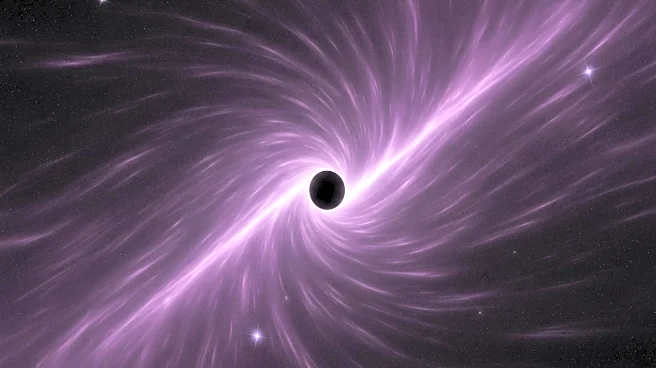What's Happening?
Astronomers have successfully measured the recoil of a black hole resulting from a collision, using gravitational waves. This marks the first time the velocity and direction of a newly formed black hole have been captured, providing a new method for understanding black hole mergers. The event, known as GW190412, occurred in 2019 and involved two black holes colliding, with the resulting black hole being kicked at speeds exceeding 50 kilometers per second. This measurement was made possible by the LIGO, Virgo, and KAGRA detectors, which have been capturing black hole collisions for the past decade. The technique used to measure the recoil was developed by astrophysicists, including Juan Calderon-Bustillo, and relies on analyzing the spins and masses of the colliding black holes.
Why It's Important?
This breakthrough in measuring black hole recoil has significant implications for astrophysics. It provides a new tool for probing the dynamics of black hole mergers, which are among the most violent cosmic events. Understanding the recoil can help scientists distinguish between true gravitational wave-electromagnetic signal pairs and random coincidences. This could lead to more accurate predictions and observations of electromagnetic signals, such as flares, associated with black hole mergers. The ability to measure the recoil also enhances the understanding of the formation and behavior of black holes in dense environments, potentially leading to new insights into the structure and evolution of galaxies.
What's Next?
The technique for measuring black hole recoil is expected to be applied to future gravitational wave events, allowing for more detailed studies of black hole dynamics. Researchers anticipate that this method will enable the identification of electromagnetic signals associated with black hole mergers, providing a more comprehensive understanding of these phenomena. As more data is collected from gravitational wave detectors, scientists will continue to refine their models and improve the accuracy of their measurements. This could lead to new discoveries about the nature of black holes and their role in the universe.
Beyond the Headlines
The ability to measure black hole recoil opens up new possibilities for exploring the ethical and philosophical implications of understanding such distant and powerful cosmic events. It challenges existing models of the universe and prompts questions about the limits of human knowledge and technology. As scientists continue to unravel the mysteries of black holes, society may need to consider the broader impact of these discoveries on our understanding of the cosmos and our place within it.










